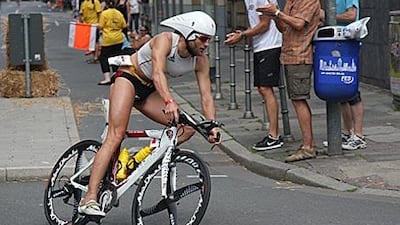The local favourite Timo Bracht smashed the Ironman Germany course record as he coasted to a debut European Championships victory while sixth-placed Team Abu Dhabi Triathlon captain Faris al Sultan was left rueing his less-than-perfect preparations and an unfortunate incident.
Emerging from the swim section just 10 seconds off the lead, the Al Ain-resident found his rhythm on the cycle stage and led the 100-strong field 80kms into the two-wheeled discipline. However, the half-German half-Iraqi lost over a minute when he mistakenly followed a motorbike off the course. The chasing pack passed the 2005 world champion as he back-tracked. "It was a fantastic race, the speed was incredible. You always want to do better but it's important to be honest with yourself and play the cards you've got," he said.
"My preparations didn't go as I wanted them to and the motorbike incident meant I lost the first group. "My energy then faded faster than I expected." With a trailblazing Bracht crossing the Frankfurt finish line in a stunning time of 7hr 59mins 15secs, al Sultan's pre-race predictions proved spot on as Spain's Eneko Llanos finfished second in 8:00:05, with Australia's Chris McCormack completing the podium in 8:02:49. Al Sultan clocked 8:20:25.
Prior to the Germany event, al Sultan insisted this outing meant little more to him than mid-season conditioning for November's all-important Hawaii world championships. After witnessing Bracht's incredible pace, however, al Sultan knows he faces a fitness battle to reach the peak condition he will need to beat the German and recapture the world crown. "Bracht has developed into a strong athlete and he has the potential to win," said al Sultan, 31.
"The podium finishers here will be the top contenders in Hawaii but it will be different there. The bike's tougher and the swim is without a wetsuit, which suits me." Team Abu Dhabi Triathlon's Andrea Brede, tipped by al Sultan for a podium finish, ended up fourth in the women's race, some 15 minutes off German winner Sandra Wallenhorst. First out of the water, Brede had a solid bike section before strugglingin the run.
emegson@thenational.ae

